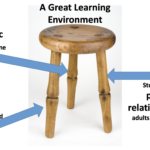Are you a teacher struggling to keep your students engaged? You’re not alone. A team of teachers at Sandown North Elementary School faced similar challenges, witnessing a decline in student engagement and an uptick in students that were dysregulated. Instead
When my district first adopted a math program I had mixed feelings. On the one hand, I was relieved. Look a this—all of my math lessons are planned for the entire year! Just imagine the time I’ll save. I won’t
You may think of the first weeks of school as a time to focus on classroom management, and it is. But in fact, all year long, we should consider classroom management an active part of our daily teaching. How do
Kathy Collins and I were co-teaching a summer workshop for teachers on how to teach reading effectively. We were sharing about different kinds of direct instruction—various ways we can teach students the skills, strategies, and mindsets they need to be
A great learning environment is like a three-legged stool. Ruth Charney first introduced this concept to me years ago. It’s an important idea to keep in mind all year long, but it’s crucial during the first weeks of school.
The
I know many educators bemoan retakes. It is often seen as giving kids too many chances, not holding them accountable, and generally “lowering the bar.” I’ve heard the warning “There are no retakes in real life!” too many times to
What Are We Doing Today in Physical Education?
“What are we doing today?” is the most frequently asked question by my middle school students while entering the gym to get ready for class. After my response, students will usually either
A friend and colleague of mine, Andy Dousis, once told me that every lesson has three moments: a golden one, a silver one, and a leaden one. Whatever you say in the first 60 seconds of the lesson is the
A few years ago my wife gave me three months of coaching for my birthday. I’d been running 5K road races and was trying some half-marathons. She thought I could use some professional help! We connected online, and I sent
“How’d it go?” On the surface, it is such a basic question. I’ve been asked that question plenty of times in my life. After a sports game, doctor’s appointment, or school meeting, not to mention that nerve-wracking best man’s speech
In the final episode of Season I of Ted Lasso, players are somber and nervous heading into a do-or-die match against a superior team. Ted decides they all need to try something new, so he invites the players to name
A Brief History of Behaviorism, Part 5
If you could travel back in time about 60 years and walk through a typical school, you might be surprised to find something missing. You wouldn’t see behavior charts or “star student” award
A Brief History of Behaviorism, Part 1
If you could travel back in time about 60 years and walk through a typical school, you might be surprised to find something missing. You wouldn’t see behavior charts or “star student” award
Do your students seem young this year? You’re not alone. In every single school I’m working in this year—with no exceptions—teachers are saying the same kinds of things.
This shouldn’t be surprising. Students always seem a bit young in the
It is now widely recognized that social-emotional learning (SEL) should be an integral part of teaching and learning in schools. Yet it sometimes feels so overwhelming. SEL is just so…BIG. How do you know where to start?
Some districts purchase
“To weave the magic of a thing, you see, one must find its true name. In my lands we keep our true names hidden all our lives long, from all but those we trust utterly; for there is great power,
In this vlog post, published through Eduplanet21, I share a story about a student who seemed motivated but wasn’t really self-motivated. She was always seeking my approval: “Is this okay? Is it good enough?” I tell about how I helped
Don’t look now, but the end of the school year isn’t far away. Of course, we know how important the first weeks of school are, but what about the last weeks of school? Surely, this is just as important a
As schools welcome more and more students back through their doors, we’re all trying to figure out the best way to do so. It seems as though there are two wildly different needs we must address. As I talk with
As educators, we all want our students to be motivated. Teachers and schools often pour immense amounts of energy into trying to motivate students, yet often it seems like the more we try, the less kids care. What’s going on?
Teacher language can be a great focus for a New Year’s resolution. After all, we all use language with students, and we all surely have some habits that could use some refinement. Often, some of our language habits don’t line
You want at-home learning to feel purposeful and engaging for students, but you don’t want to further overwhelm yourself with work. What if there was a way to both boost student engagement and reduce the daily assigning, correcting, and keeping
Games can boost engagement and learning for students while also reducing teacher workload--a win-win!
What if there was a learning strategy that boosted student engagement, had many (many!) academic benefits for students, and reduced teacher planning and correcting/grading time? Great news! There is–and it’s a tried and true strategy you have probably been using
After the abrupt ending to school last year, the hope and goal was to begin the 2020 – 2021 school year ready to thrive in whatever format teaching would occur. Many teachers were feeling more comfortable with remote teaching and













